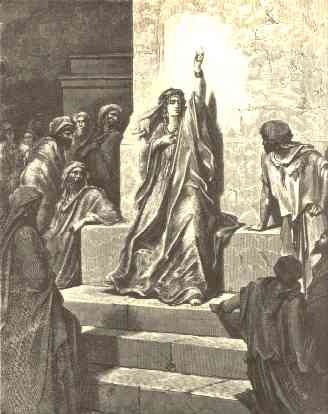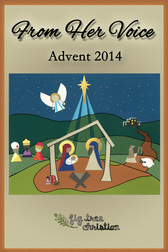|
The Story: (Kings 4-5) CEB 4:1 After Ehud had died, the Israelites again did things that the Lord saw as evil. 2 So theLord gave them over to King Jabin of Canaan, who reigned in Hazor. The commander of his army was Sisera, and he was stationed in Harosheth-ha-goiim. 3 The Israelites cried out to the Lord because Sisera had nine hundred iron chariots and had oppressed the Israelites cruelly for twenty years. 4 Now Deborah, a prophet, the wife of Lappidoth, was a leader of Israel at that time.5 She would sit under Deborah’s palm tree between Ramah and Bethel in the Ephraim highlands, and the Israelites would come to her to settle disputes. 6 She sent word to Barak, Abinoam’s son, from Kedesh in Naphtali and said to him, “Hasn’t the Lord, Israel’s God, issued you a command? ‘Go and assemble at Mount Tabor, taking ten thousand men from the people of Naphtali and Zebulun with you. 7 I’ll lure Sisera, the commander of Jabin’s army, to assemble with his chariots and troops against you at the Kishon River, and then I’ll help you overpower him.’” 8 Barak replied to her, “If you’ll go with me, I’ll go; but if not, I won’t go.” 9 Deborah answered, “I’ll definitely go with you. However, the path you’re taking won’t bring honor to you, because the Lord will hand over Sisera to a woman.” Then Deborah got up and went with Barak to Kedesh. 10 He summoned Zebulun and Naphtali to Kedesh, and ten thousand men marched out behind him. Deborah marched out with him too. Every once in awhile it is nice just to introduce a person/place/thing and explain the biblical context. The last time I did this was with Leviathan. This time, I want to talk about a biblical character, and one I was not introduced to until I was in my first year of seminary. Who was Deborah? I discovered her name means "bee" in Hebrew. As Melissa, which means "honeybee" in Greek, I think I found my biblical sister. Yet, who she really is goes deeper than a name. Deborah was a judge: Judges were the local leaders of Israel before there was a king. There were "major" and "minor" judges. The minor judges were there to settle local disputes. The major judges were like commanders, and they protected Israel from it's foe: Canaan. All of these judges, major or minor, were considered to be acting from God's judgement, not their own. It was important they remained pure to be an outlet to receive that divine message. (For example, Sampson's purity was in his hair, so he was powerless once it was cut.) Overall, there were 6 major judges, and 6 minor judges mentioned in the book of Judges. Deborah was female: Twelve judges are mentioned in the book of Judges. According to some, this particular book has been through at least two rewrites before it became canonized. I know this might make some uncomfortable. We like to think the bible went from the oral tradition directly to written. Historical theologians just don't believe this was the case. With that in mind, this is why it is so impressive Deborah made the cut. This was from a very patriarchal time. Women and children were considered property. It's a tremendously huge deal out of twelve known judges, one was female. I mentioned earlier how it wasn't until my first year of seminary I heard about Deborah. I was working as seminary intern at a DOC church in Tucker. I was helping the associate minister set up the quarterly Sunday School board. This church had written their own three year curriculum. In many ways it mimicked the Revised Common Lectionary. Where there were major biblical stories, they followed it. Where there were not, they filled it in with stories not in lectionary. Deborah was one of these stories. To me, leaving Deborah out seemed like a blatant ignoring of the biblical story. It's one of those moments where you see God picking a female to lead the people. It's a scandalous story for anyone who doesn't believe God calls females to Christian places of power. She is an example, and I was hurt to learn so late she existed. Deborah, in her power, gave the reward away: This little bit is really for us gals, but I'm sure the guys can gain something from it too. Want to know who stands in the churches way to hire a female minister more often than not? Other females. I've heard it from multiple congregations. The guys tell me, "I wanted to seriously consider a female minister, but the women on the search committee said we were not ready." The Ladies tell me, "We included females in the long list of candidates, but I don't really think the congregation is ready for a female minister yet. I'm ready, but they are not." I honestly have opinions why this happens in church, but no hard evidence. My strongest opinion is something I call a "senior complex." When I was a freshmen in highschool the seniors had all these privileges. They were allowed to go outside to eat. They had freedom to leave campus without special authorization. They were a little cruel to the freshmen and sophomores. They always told us, "Don't worry, you'll be like us someday. You'll get what we get." Well, someday came, but so did Columbine. Everything changed overnight, including the rules for seniors. We were upset because we had to suffer through upperclassmen treating us poorly, then we were not allowed to do the same when we became seniors. (Now, I personally decided to befriend the freshmen. I didn't want them to feel uncomfortable their first year in high school. Different story for another day.) I think there are two groups of women. The first group of women were told they did not have the power. They flexed their call in different ways: leading Christian Women's Fellowship, taking over welcoming committees, nudging their husbands to act on their behalf. Those kinds of things. It's not that they believe women can't be ministers, it's just they found a way to do ministry in the church without the minister title. Some of these women would have gone to seminary if they felt they had the opportunity. I can see how it can be painful to accept someone else's call, when these women were told their call was not biblical. From the other end, I fear we see female ministry in terms of scarcity instead of abundance. Realistically, if God is going to call 1,000 female ministers, there is going to be a place for all them in God's plan. Yet, it's like we get stuck in what we don't have, instead of what we've already been given. Instead of celebrating Deborah as the female judge, we see how only 1/12 of the judges were female. If we can't see God's abundance within the call, we can be left bitter and ungrateful. This is where we can take something from Deborah. When she tells Barak the battle will be won at the hands of a woman, it is natural to assume that means Deborah will be the one to win the battle. She is the commander, she will take the glory. This is not the case. The glory went to Jael, who defeated Sisera by driving a tent peg into his temple. (Colorful, I know.) Then, when the truth of his demise is learned, it is Deborah who sings of the victory! Deborah was most definitely living a time where praising a female was a scarce commodity. It's important to see Deborah was not a judge to glorify herself, but to glorify God. In knowing her purpose, she was able to sing praises to another.
|
Categories
All
Archives
October 2023
|





 RSS Feed
RSS Feed